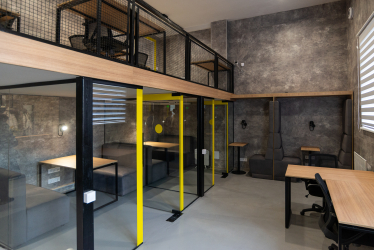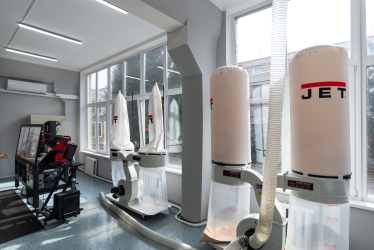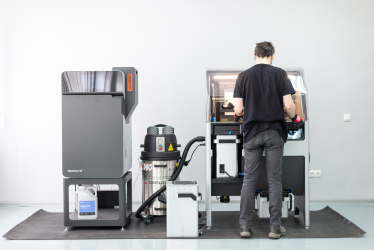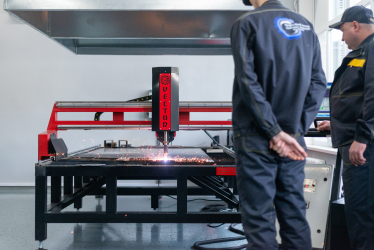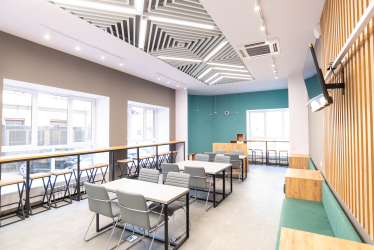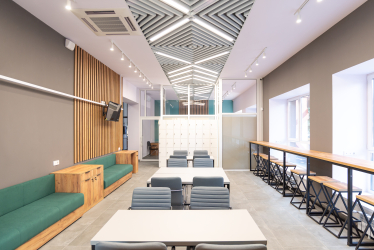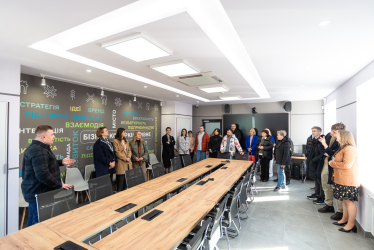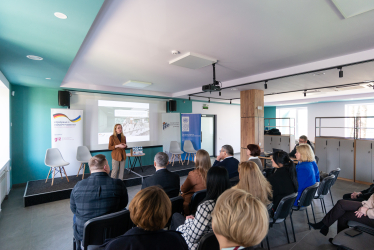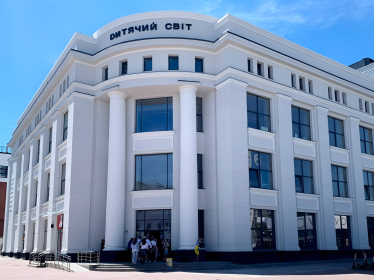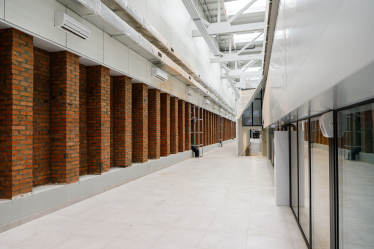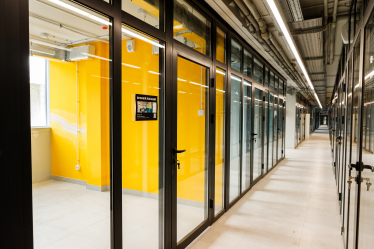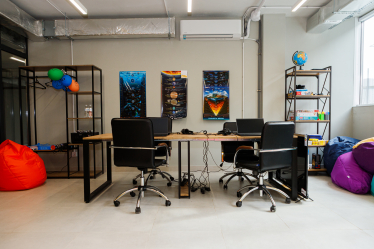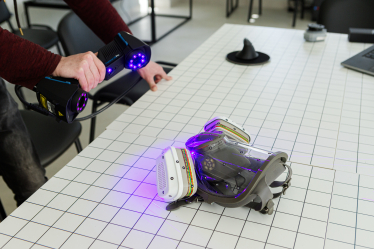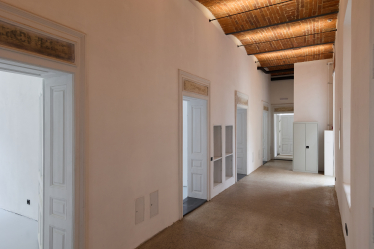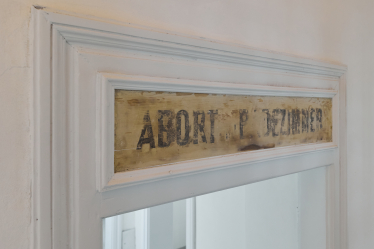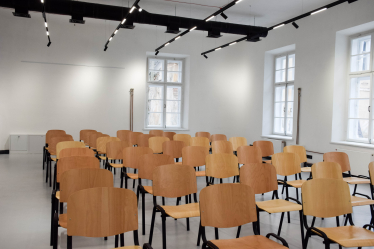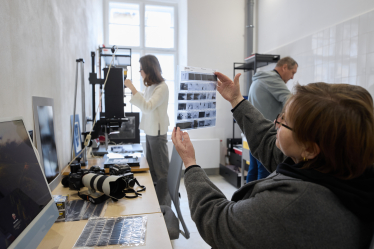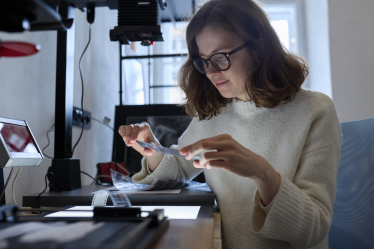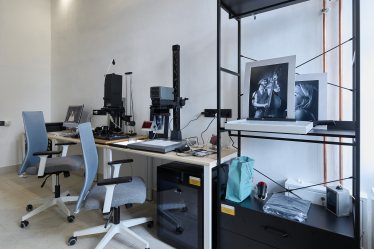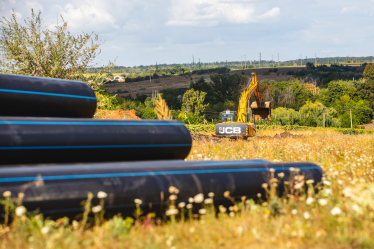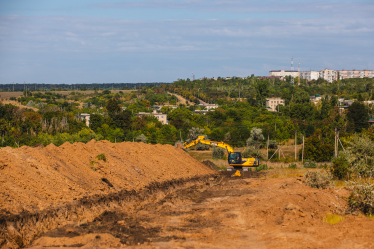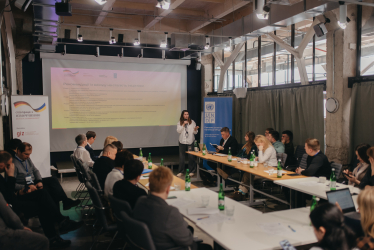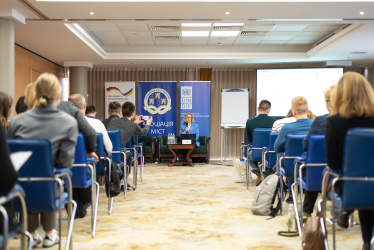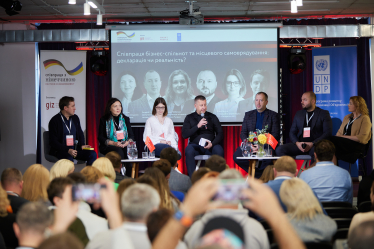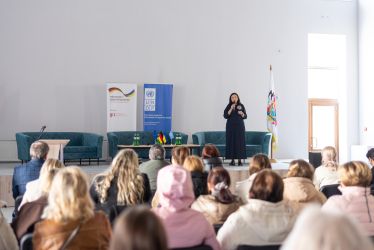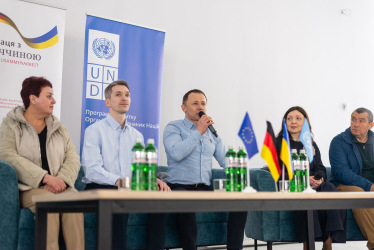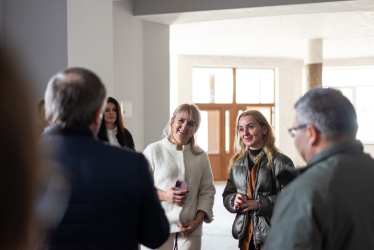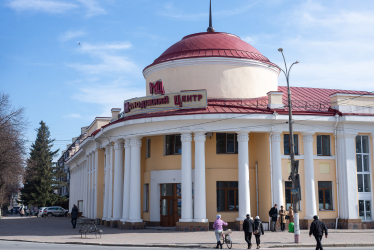In the very heart of Khmelnytskyi stands the imposing «Childrenʼs World» shopping center. Today, itʼs a vibrant, modern hub – a true centerpiece for the cityʼs textile and creative industries. Business events, exhibitions, training sessions, and fashion shows are held here. Itʼs hard to believe that just two years ago, the «Childrenʼs World» was severely dilapidated: internal systems were crumbling, the facade was peeling, and the wind whistled through the old window frames. Built in the 1950s, the building couldnʼt compete with contemporary commercial centers and desperately needed renovation. The property had long been a burden, energy-inefficient and costly to maintain for the local authorities.
Everything shifted approximately two years ago. Through grant funding provided by the German government via GIZ and the United Nations Development Programme for the «Support to Rapid Economic Recovery of Ukrainian Municipalities» (SRER) project, the old building gained a new lease on life. Over 38 million hryvnias were spent on its revitalization. Khmelnytskyi was one of twelve cities that received support under this initiative. What is this project, and how exactly has it impacted local businesses? Forbes BrandVoice explains.
SRER: New Business Opportunities
The full-scale war is forcing not only citizens but also businesses to seek safer environments. In a year and a half since the invasion began, 840 enterprises have taken advantage of the state relocation program alone, with the majority moving to western regions. This has placed a significant strain on local communities. Amid the shock of war, the growing demand for infrastructure outstripped capacity – there was a shortage of premises, modern business spaces, and resources to connect to critical utilities.
The goal of the SRER project was to support local recovery and infrastructure development initiatives for businesses by providing financial support to local self-government bodies. This enabled cities to improve the business environment for both local and relocated enterprises. Specifically, this involved the reconstruction and renovation of old, neglected buildings and their transformation into modern spaces for the development of micro, small, and medium-sized businesses. Applications for participation in the program were selected based on several criteria, key among which were the projectʼs feasibility, a clear action plan, and the presence of a strong implementation team.
As a result, the project encompassed regional centers across Ukraine, including Lutsk, Rivne, Zhytomyr, Chernihiv, Ternopil, Khmelnytskyi, Vinnytsia, and Ivano-Frankivsk, as well as smaller cities like Zviahel, Stryi, Smila, and Lozova. The winners received funding for the renovation of premises and the purchase of equipment to improve local business infrastructure. The size of the allocated grant varied from $430,869 to $1,085,959, averaging $800,000 per municipality.
Thanks to the SRER project, nine new business facilities have sprung up in various Ukrainian cities. For instance, in Lutsk, the old «Batkivshchyna» cinema, built back in 1939, has been transformed into a multi-functional business center. The cinema in Zviahel, which was almost completely destroyed by fire in 2018, has also been given a new lease on life, reopening as a modern space with conference halls and a media library. This March saw the launch of the «Entrepreneurship Laboratory» in Zhytomyr – a complex featuring a co-working space and production workshops for material processing, prototyping, and 3D manufacturing. And in Rivne, a municipal co-working space was unveiled, including an open-plan area, two showrooms, an exhibition and conference hall, and meeting rooms.
A multifunctional business center was launched in Lutsk instead of the old Batkivshchyna cinema
Coworking and production workshop complex in Zhytomyr
Coworking and production workshop complex in Zhytomyr
Coworking and production workshop complex in Zhytomyr
Coworking and production workshop complex in Zhytomyr
Municipal coworking in Rivne
Municipal coworking in Rivne
Municipal coworking in Rivne
Municipal coworking in Rivne
«The reconstruction of these sites will enhance the visibility of local brands, provide a new impetus for the development of local businesses, and attract a new audience», says Mustafa Sait-Ametov, Head of the Regional Development Programme at UNDP Ukraine.
Rebooting the «Childrenʼs World» Shopping Center in Khmelnytskyi
Late last year, the revitalized «Childrenʼs World» shopping center in Khmelnytskyi welcomed ProModni, a new hub uniting entrepreneurs in the fashion industry. «When I was invited to see how the well-known shopping center had been reorganized, I was genuinely impressed. Itʼs now the only venue in the city where I can confidently invite wedding dress designers», says Maryna Vasylieva, owner of Yedyna Wedding Studios. «Such a space was absolutely crucial for us, because Ukrainian wedding dresses are now famous worldwide – we compete with global manufacturers. Whatʼs more, weʼre gaining ground in European, Chinese, and American markets. Thanks to the SRER project and the city authorities, we now have the opportunity to hold shows and other events in such a modern space».
As part of the program, the local authorities undertook a major renovation of the building, updating the facade and interior spaces, modernizing the utility networks, and purchasing equipment. «ʼChildrenʼs Worldʼ is a kind of symbol of the city, and now it has also become a powerful platform for the development of local entrepreneurship, which will make our city stronger and better», believes Mayor Oleksandr Symchyshyn.
The spaceʼs continued operation will be funded not only by grant programs but also by other sources, including revenue from renting out premises and partnership initiatives with business associations and educational institutions. «Within these walls, a dynamic ecosystem will take shape, giving a boost to Khmelnytskyiʼs economy and creating new economic opportunities for residents, including relocated businesses», emphasized Mustafa Sait-Ametov.
Park of Opportunities: An Innovation and Technology Hub in Vinnytsia
The renovated buildings have also become a lifeline for relocated businesses. For example, the «Pirena» research and production company, which manufactures foaming agents and workwear, moved to Vinnytsia, where the «Crystal» Innovation and Technology Park was opened thanks to the SRER project. «Such technology parks should exist in every city, as they provide additional opportunities for both local and relocated companies», says Oleksandr Hryshchenko, director of «Pirena». «Our company has been around since 1992, and if it werenʼt for the Russians, we could have developed our enterprise in the Luhansk region, but they destroyed everything. We decided to relocate production to Vinnytsia because, firstly, the new «Crystal» park is an ideal fit for us, and secondly, I havenʼt seen such a responsible attitude from the authorities towards business anywhere else».
The Innovation and Technology Park was created on the site of the old «Crystal» factory, which used to produce jewelry. Construction began in 2021, but due to the full-scale invasion, work had to be suspended as funding from the state budget ceased. «We are grateful that the German government, GIZ, and UNDP supported us and took over the project – otherwise, we would have lost all our achievements», explains Kateryna Babina, head of the Municipal Investment Fund» a municipal enterprise. «The space has been given a new lease on life and continues to develop as a vibrant ecosystem uniting small and large enterprises. The cooperation with educational institutions should also be highlighted, as it will create a synergy between business and education in the future».
In the future, «Crystal» is expected to become a point of economic growth and a business incubator for SMEs and innovative businesses, believes Volodymyr Merezhko, director of the «Vinnytsia Business Club» public organization. «The construction of such technology parks will give impetus to the emergence of startups, which is very important for our region», states Volodymyr. «To better understand the needs of entrepreneurs and respond to them promptly, our representative office will operate on the territory of «Crystal». It will become a key platform for communication and cooperation between companies».
The list of future ecosystem participants is already 70% full. Currently, the search for funding is underway to reconstruct the projectʼs second phase with almost 5,000 square meters more, which should enhance the existing space.
A Territory of Innovation in Ivano-Frankivskʼs Historic Palace
The Potocki Palace in Ivano-Frankivsk, dating back to the 17th century, is a landmark of significant historical architecture. After the bankruptcy of its last owner, the palace served as a hospital for a long time, and for the past decade, it had stood completely closed. Funding within the SRER program was directed by local authorities towards construction and restoration work, the laying of external utility networks, and the purchase of furniture and equipment to set up sound recording studios, analog and digital photography studios, a co-working space, and a conference hall. The SRER project not only restored a neglected architectural gem in the center of Ivano-Frankivsk but also breathed new life into it. «Our goal was to create a multi-functional communal space to support local and relocated businesses, as well as representatives of the analog and digital photography and sound recording industries», explains Ihor Popadyuk, Director of the Department of Investment Policy, Projects, International Relations, Tourism and Promotions of the Ivano-Frankivsk City Council.
The newly created space has already hosted a series of events, including meetings with key stakeholders, a creative industries conference, thematic workshops, and a final forum for the project initiative. «In the future, the facility will function as a co-working space and a platform for entrepreneurial, educational, and cultural initiatives. Our main goal is to make the space self-sufficient and competitive in the local services market», emphasizes Ihor Popadyuk.
A New Lease on Water Infrastructure
Chernihiv endured 37 days of blockade following the start of the full-scale invasion. This led to a humanitarian crisis due to constant shelling and the destruction of vital infrastructure. During the hostilities in the Chernihiv region, approximately 3,500 buildings were damaged or destroyed, the majority of which were residential homes. In the city itself, 27 schools, 37 kindergartens, and three out of four hospitals suffered severe damage. Critical infrastructure also sustained significant destruction – three of the five largest pumping stations were completely destroyed by targeted shelling by the Russian Federationʼs forces. In particular, a water pipeline over two kilometers long, which supplied water to about 42,000 residents and over 35 businesses, was damaged.
In addition to the destruction from shelling, this water pipeline, built in 1969, was in poor technical condition due to sediment and pipe corrosion. After the start of the reconstruction, supported by GIZ and UNDP, it became clear that the pipeline had long needed repair. Mykyta Ponomarenko, Deputy Chief Engineer of «Chernihivvodokanal», shared: «When we received funding from the donor and started the reconstruction of the water pipeline, it was one of the best decisions. The pipeline was in terrible condition, with a mixture of different materials – cast iron, steel, reinforced concrete, huge leaks, and internal deposits. After the reconstruction, the peak flow from the pumping station increased by 30-40%! Together with the 35 enterprises that use this water pipeline, we discussed the feasibility of this work, and we are already seeing significant improvements in water supply».
In total, three water pipelines were repaired under the SRER project in Chernihiv, Lozova, and Smila. «No business can operate without a water supply and sanitation. While large businesses can still provide themselves with water by drilling wells, this is often impossible for small and medium-sized enterprises due to a lack of funds or physical constraints on the ground. Our project provided water supply and sanitation not only to existing enterprises but also to entire micro-districts in each of the cities», comments Andrii Podenezhko, a municipal infrastructure development specialist at UNDP Ukraine. According to him, the main criterion for selecting such projects was the presence of enterprises that were subscribers to these networks, and an additional factor was the local authoritiesʼ ability to quickly allocate and implement co-financing.
SRERʼs Educational Component: Strategies for Sustainability
Beyond the direct investments in facilities, their repair, and the procurement of equipment, the SRER project supported a range of activities aimed at ensuring the sustainability of local initiatives. To achieve this, GIZ and UNDP engaged leaders in the field of local development: the «Promprylad» Foundation from Ivano-Frankivsk, the Association of Ukrainian Cities, and the Smart People business school from Rivne. The result of their joint efforts was the development of 12 sustainability strategies for all the supported initiatives, outlining operational models for after the facilities are commissioned.
The SRER project supported a number of activities aimed at ensuring the sustainability of local initiatives
The SRER project supported a number of activities aimed at ensuring the sustainability of local initiatives
The SRER project supported a number of activities aimed at ensuring the sustainability of local initiatives
The SRER project supported a number of activities aimed at ensuring the sustainability of local initiatives
The SRER project supported a number of activities aimed at ensuring the sustainability of local initiatives
A key aspect in shaping the concept of the facilities and subsequent training programs was considering the interests of the local business community. The Smart People business school team acted as a catalyst for dialogue between business associations and representatives of local municipalities. «Our role was to involve key stakeholders and beneficiaries of the facilities, namely business associations, industry clusters, and other entrepreneurial unions, in dialogue with government representatives», explains Taras Komarenko, founder of Smart People. «And sometimes, the first step was actually creating such business associations, because in small towns, entrepreneurs usually rarely form alliances to collectively advocate for their needs».
In particular, in Zviahel, the Smart People team facilitated the creation of an association of the cityʼs key employers – the Zviahel Business Club. «We explained the value of creating a formalized business association and helped to shape a strategic vision, identify pressing problems of local entrepreneurship, and outline ways to solve them with the active participation of the city authorities», shares Taras. «Our efforts in Rivne also proved to be very fruitful, where we managed to initiate new business associations, in addition to the traditional furniture cluster and light industry association».
Opening of the facility in Zvyagel with the participation of the local business club
Opening of the facility in Zvyagel with the participation of the local business club
Opening of the facility in Zvyagel with the participation of the local business club
Opening of the facility in Zvyagel with the participation of the local business club
This approach proved particularly valuable for relocated enterprises, which were able to unite, make themselves known, and find new development opportunities. «Sometimes, even the city councils themselves did not fully realize the full potential of the existing business associations in their cities», states Komarenko. According to him, a significant achievement was that practically every mayor in the communities initiated the creation of a business support council, which included leaders of key business associations. «Now, if necessary, the city authorities can turn to this council to find out the opinion of business association members on proposed initiatives. This practice has become quite common, in contrast to the situation at the beginning of the project, when meetings between mayors and representatives of various business associations in a unified format were rare», asserts Taras Komarenko.
Ultimately, thanks to the work of the Smart People business school, the reconstructed infrastructure facilities will best meet the urgent needs of local entrepreneurship. «All these efforts will have a significant impact not only on increasing the competitiveness of local businesses but also on the overall recovery and strengthening of the economic foundation of communities», believes Mustafa Sait-Ametov, Head of the Regional Development Programme at UNDP Ukraine.
Вы нашли ошибку или неточность?
Оставьте отзыв для редакции. Мы учтем ваши замечания как можно скорее.



